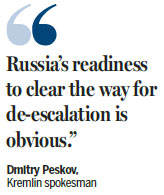US slaps sanctions on DPRK; Russia offers to mediate
WASHINGTON/MOSCOW - The United States has issued sanctions on two citizens of the Democratic People's Republic of Korea over their alleged involvement in the country's ballistic missile programs, while Russia reiterated an offer to mediate to ease tension between Washington and Pyongyang.
The sanctions on Tuesday block the two DPRK citizens from any property or interests in property within US jurisdiction, and prohibit them from transactions with US citizens. The US Treasury Department said the men are senior officials in DPRK's Munitions Industry Department.
Tensions on the peninsula have reached an unprecedented level this year as the DPRK launched a nuclear test and multiple missile launches, and the US and the Republic of Korea have conducted joint military drills.
The crisis has also been worsened by the exchange of personal insults and confrontational rhetoric between the leaders of the US and the DPRK.

The US administration, under President Donald Trump, has been sticking to a strategy of "maximum pressure" on the DPRK to force it to abandon its weapons programs, but so far has failed to achieve its goals.
Baik Tae-hyun, spokesman of the ROK's Unification Ministry, expressed hope on Wednesday that the continuing campaign of sanctions and pressure will eventually force Pyongyang into "making the right decision" and engaging in dialogue over its nuclear program.
Also on Tuesday, the Kremlin, which has long called for the US and the DPRK to negotiate, said it was ready to act as a mediator if the two sides were willing for it to play such a role.
"Russia's readiness to clear the way for de-escalation is obvious," Kremlin spokesman Dmitry Peskov told reporters.
Asked to comment on the offer, a spokesman for the US State Department, Justin Higgins, said that Washington "has the ability to communicate with North Korea through a variety of diplomatic channels".
Aggressive rhetoric
Russian Foreign Minister Sergei Lavrov, who made a similar offer on Monday, told US Secretary of State Rex Tillerson in a phone call on Tuesday that "Washington's aggressive rhetoric" and beefing up of its military presence in the region had heightened tension and was unacceptable, his ministry said in a news release.
Lavrov underscored the need for "the fastest move to the negotiating process from the language of sanctions", it said.
The two sides believe that Pyongyang's nuclear missile development violated the requirements of the United Nations Security Council, it said, underscoring the need for "an early transition from words of sanctions to a negotiation process".
During the phone call, the two top diplomats also considered steps to overcome the conflicts in Syria while maintaining its territorial integrity, including the plan to hold an inter-Syrian national dialogue in Russia's Sochi.
Xinhua - Ap - Reuters
(China Daily 12/28/2017 page12)














